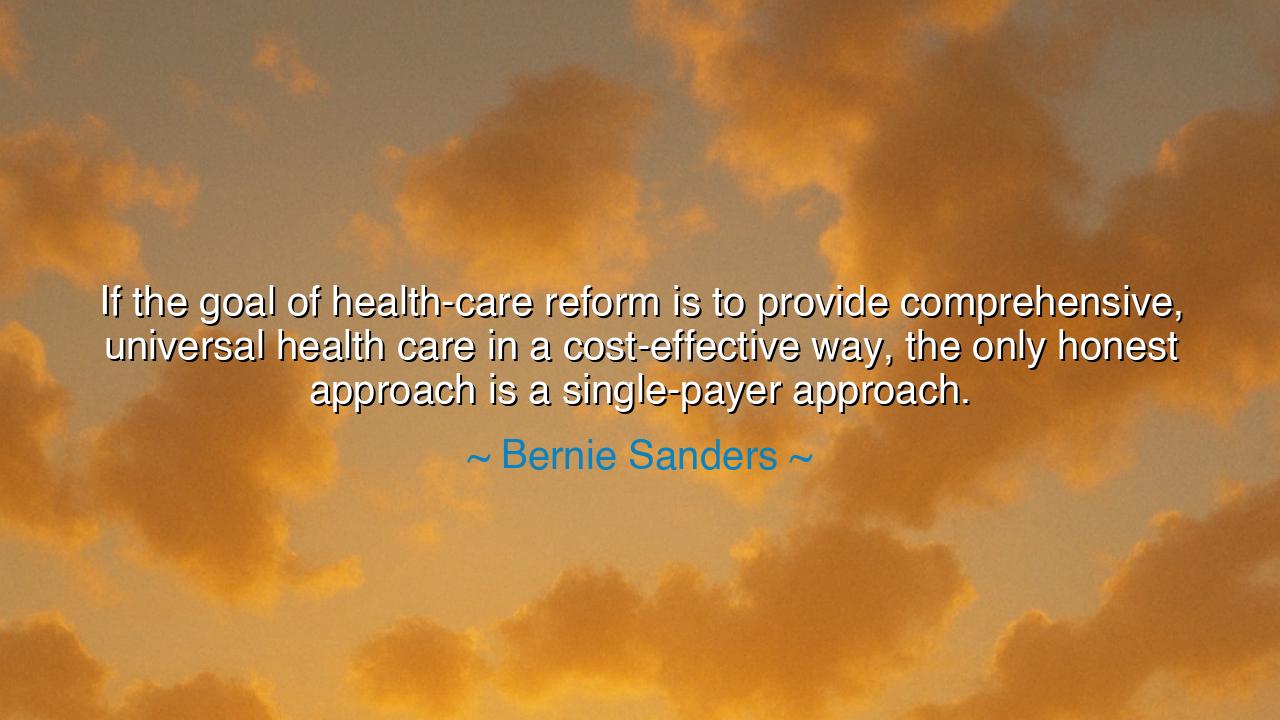
If the goal of health-care reform is to provide comprehensive
If the goal of health-care reform is to provide comprehensive, universal health care in a cost-effective way, the only honest approach is a single-payer approach.






In the words of Bernie Sanders, a man who has long walked the path of justice for the common folk, there echoes a truth older than the cities of men: “If the goal of health-care reform is to provide comprehensive, universal health care in a cost-effective way, the only honest approach is a single-payer approach.” These words are not merely political; they are moral. They speak of the ancient duty of the tribe, the village, the nation—to care for all its people, not merely the strong, the wealthy, or the fortunate. For when one among us suffers without healing, the whole community is diminished.
In ages past, the elders gathered by the fire to speak of shared burdens. When one hunter fell ill, the others hunted for him. When one mother wept for lack of medicine, the tribe gathered herbs and prayers to ease her pain. This was not charity—it was survival, it was humanity. The single-payer approach, in its essence, is nothing but this same ancient principle reborn in modern garb: that all contribute to a common pool so that all may be healed when the time of sickness comes. It is not the law of greed but the law of compassion, not the rule of the market but the rhythm of the heart.
Long ago, in the lands of the rising sun, there was a nation—Japan—that chose this path. After the ruins of war, when cities were dust and hearts were hollow, their leaders decreed that every citizen should have access to universal health care. It was not wealth that guided them, for they had little; it was honesty of purpose. They understood that to rebuild a nation, one must first heal its people. And from that healing arose strength, prosperity, and a spirit of unity that carried them through the trials of time. Such is the power of a system built not on profit, but on the sacred trust of shared humanity.
Contrast this with the world where profit governs medicine, where the sick become coins in the coffer of the mighty. There, hospitals gleam like temples of gold, but the poor lie at their gates, unseen and unheard. The physicians within, though skilled and noble, are bound by the chains of bureaucracy and profit, unable to serve as freely as their oaths command. And so, the healer’s art becomes distorted by the hunger of the market. Sanders’s words strike like a bell of truth against this injustice, reminding us that health is not a commodity—it is a right.
The single-payer system demands courage, for it asks us to shed illusion. It strips away the veil that hides inequality and forces society to confront the truth: that we are one body. If one limb festers while another flourishes, the whole creature weakens. The honest approach, as Sanders calls it, is not merely policy—it is integrity. It is saying, “We will no longer pretend that half-measures suffice.” Honesty here means aligning our values with our actions, making the moral will manifest in law.
Remember, my friends, the story of Florence Nightingale, the lady of the lamp, who walked among the dying soldiers in the dim tents of war. She did not ask who could pay; she did not ask which army they served. She saw only suffering and knew that to heal was to serve life itself. That spirit—the spirit that bends low to heal without judgment—is the same spirit that moves within the idea of universal, single-payer care. It is not a matter of politics but of the human soul refusing to turn away.
Let those who hear these words take them to heart: when you encounter the suffering of others, whether in the hospital ward or in the quiet streets of your city, do not look away. Support systems that place care above cost, compassion above profit, and truth above convenience. Speak, vote, act, and give as though your neighbor’s life were your own—because it is. For the destiny of a people is not measured by the wealth of its few, but by the well-being of its many.
Thus, the lesson endures: true reform is born of honesty and love. To heal a nation, one must first choose truth over comfort, unity over division, and service over gain. Walk in that truth, and future generations will look back upon this age and say, “Here were a people who remembered the wisdom of the ancients—who made compassion their law and justice their medicine.”






AAdministratorAdministrator
Welcome, honored guests. Please leave a comment, we will respond soon